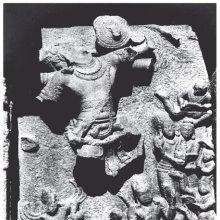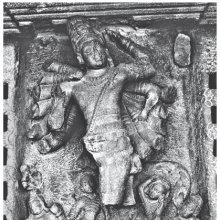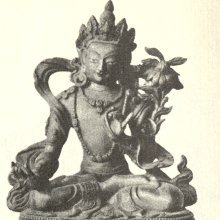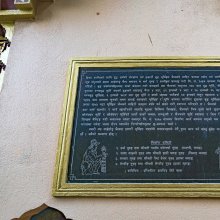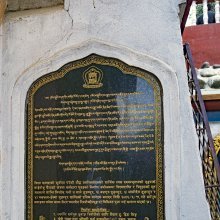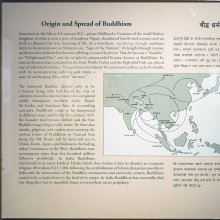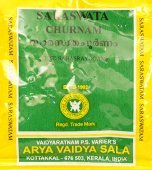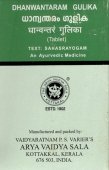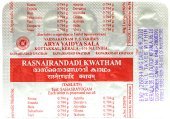Vishva, Viśva, Viśvā, Viṣva, Vishvasa: 39 definitions
Introduction:
Vishva means something in Hinduism, Sanskrit, Jainism, Prakrit, the history of ancient India, Marathi, Hindi, biology. If you want to know the exact meaning, history, etymology or English translation of this term then check out the descriptions on this page. Add your comment or reference to a book if you want to contribute to this summary article.
The Sanskrit terms Viśva and Viśvā and Viṣva can be transliterated into English as Visva or Vishva, using the IAST transliteration scheme (?).
Alternative spellings of this word include Visv.
Images (photo gallery)
(+3 more images available)
In Hinduism
Ayurveda (science of life)
Cikitsa (natural therapy and treatment for medical conditions)
Source: Wisdom Library: Ayurveda: CikitsaViśva (विश्व):—Another name for Śuṇṭhī (Zingiber officinale), a species of medicinal plant and used in the treatment of fever (jvara), as described in the Jvaracikitsā (or “the treatment of fever”) which is part of the 7th-century Mādhavacikitsā, a Sanskrit classical work on Āyurveda.
According to the Rājanighaṇṭu (verses 5.24-28), Viśvā is not only a synonym for Śuṇṭhī, but also for Śṛṅgavera, which is the Sanskrit word referring to fresh ginger (the same Zingiber officinale). The Rājanighaṇṭu is a 13th century medicinal thesaurus.
Source: Ancient Science of Life: Botanical identification of plants described in Mādhava CikitsāViśva (विश्व) (or Śuṇṭhī, Viśvabheṣaja, Nāgara, Śṛṅgavera) (one of the tryuṣaṇa) refers to the medicinal plant Zingiber officinale Roxb., and is used in the treatment of atisāra (diarrhoea), according to the 7th century Mādhavacikitsā chapter 2. Atisāra refers to a condition where there are three or more loose or liquid stools (bowel movements) per day or more stool than normal. The second chapter of the Mādhavacikitsā explains several preparations [including Viśva] through 60 Sanskrit verses about treating this problem.
The plant Zingiber officinale Roxb. (Viśva) is also known as Ārdraka according to both the Ayurvedic Formulary and the Ayurvedic Pharmacopoeia of India.
Kalpa (Formulas, Drug prescriptions and other Medicinal preparations)
Source: Shodhganga: Edition translation and critical study of yogasarasamgrahaViśva (विश्व) is another name for “Nāgara” and is dealt with in the 15th-century Yogasārasaṅgraha (Yogasara-saṅgraha) by Vāsudeva: an unpublished Keralite work representing an Ayurvedic compendium of medicinal recipes. The Yogasārasaṃgraha [mentioning viśva] deals with entire recipes in the route of administration, and thus deals with the knowledge of pharmacy (bhaiṣajya-kalpanā) which is a branch of pharmacology (dravyaguṇa).
Nighantu (Synonyms and Characteristics of Drugs and technical terms)
Source: WorldCat: Rāj nighaṇṭuViśva (विश्व) is another name for Śuṇṭhī, a medicinal plant identified with Zingiber officinale Rosc. or “ginger root” from the Zingiberaceae or “ginger” family of flowering plants, according to verse 6.24-26 of the 13th-century Raj Nighantu or Rājanighaṇṭu.—Note: Śuṇṭhi is dried and specially prepared form of Ārdraka by removing the outer scales of the rhizome. The major part of the oil of ginger remains in these scales and is obtained from the Śuṇṭhī/Ārdraka with scales.—The sixth chapter (pippalyādi-varga) of this book enumerates ninety-five varieties of plants obtained from the market (paṇyauṣadhi). Together with the names Viśva and Śuṇṭhī, there are a total of fifteen Sanskrit synonyms identified for this plant.
Toxicology (Study and Treatment of poison)
Source: Shodhganga: Kasyapa Samhita—Text on Visha ChikitsaViśvā (विश्वा) is the name of an ingredient used in the treatment of snake-bites such as those caused by the Hemamaṇḍalī-snakes, according to the Kāśyapa Saṃhitā: an ancient Sanskrit text from the Pāñcarātra tradition dealing with both Tantra and Viṣacikitsā—an important topic from Āyurveda which deals with the study of Toxicology (Viṣavidyā or Sarpavidyā).—Accordingly, one of the treatments is mentioned as follows: “[...] A gruel made of Girikarṇikā, Vacā, Viśvā, Kuṇḍala and pepper is to be sprinkled. Honey mixed with Girikarṇikā must be smeared inside the nose.Yellowness of eyes, impaired hearing, anaemia, eye infection, water flowing down from the eyes and bleeding from the pores of the hair on the skin , debility and reduced vision are treated by applying a paste of Dvipatra, dry ginger, pepper, tamarind, root of Śigru and Vacā. [...]”.

Āyurveda (आयुर्वेद, ayurveda) is a branch of Indian science dealing with medicine, herbalism, taxology, anatomy, surgery, alchemy and related topics. Traditional practice of Āyurveda in ancient India dates back to at least the first millenium BC. Literature is commonly written in Sanskrit using various poetic metres.
Purana and Itihasa (epic history)
Source: archive.org: Puranic Encyclopedia1) Viśva (विश्व).—A Kṣatriya King. It is stated in Mahābhārata, Ādi Parva, Chapter 67, Stanza 36, that this King was born from a portion of Mayūra, an asura.
2) Viśvā (विश्वा).—A daughter of Prajāpati Dakṣa. (Mahābhārata, Ādi Parva, Chapter 65, Stanza 12).
Source: archive.org: Shiva Purana - English Translation1) Viśva (विश्व) or Viśvedeva refers to one of the various classifications of Gaṇas: a group of deities attached to Lord Śiva.—Gaṇas are troops who generally appear in classes. Nine such classes are mentioned in the Purāṇas: They are (1) Ādityas (2) Viśvas or Viśvedevas (3) Vasus (4) Tuṣitas (5) Ābhāsvaras (6) Anilas (7) Mahārājikas (8) Sādhyas (9) Rudras. These are attached to Lord Śiva and serve under the command of Gaṇeśa, dwelling on Gaṇaparvata identified with Kailāsa—a peak of the Himālaya mountain.
2) Viśva (विश्व) refers to the “universe”, and is used to describe Śiva, according to the Śivapurāṇa 2.2.41.—Accordingly, as Viṣṇu and others eulogized Śiva:—“[...] obeisance to Thee the blue-necked, the creator, the supreme soul, the universe (i.e., Viśva), the speed of the universe and the cause of the bliss of the universe. You are Oṃkāra, Vaṣaṭkāra, the initiator of enterprises, Hantakāra, Svadhākāra and the partaker of Havya and Kavya offerings always”.
Source: Cologne Digital Sanskrit Dictionaries: The Purana Index1a) Viśva (विश्व).—A name of Hari.*
- * Bhāgavata-purāṇa XII. 11. 22.
1b) The Gandharva presiding over the month, Tapasya.*
- * Bhāgavata-purāṇa XII. 11. 40.
1c) A branch of the Bhārgava gotra.*
- * Vāyu-purāṇa 65. 96.
1d) A son of Upamadgu.*
- * Viṣṇu-purāṇa IV. 14. 9.
1e) A Satya god.*
- * Brahmāṇḍa-purāṇa II. 36. 34.
1f) False; like a serpent in rope, and water in the desert, etc.*
- * Vāyu-purāṇa 104. 39.
2a) Viśvā (विश्वा).—A river in Bhāratavarṣa.*
- * Bhāgavata-purāṇa V. 19. 18.
2b) A daughter of Dakṣa and one of the ten wives of Dharma married by Brāhma form; her sons were Viśvedevas.*
- * Bhāgavata-purāṇa VI. 6. 4. and 7; Brahmāṇḍa-purāṇa III. 3. 3 and 30. Matsya-purāṇa 5. 16-17; 203. 12; Vāyu-purāṇa 66. 3, 31; 76. 3; Viṣṇu-purāṇa I. 15. 105.
2c) One of the 13 wives of Kaśyapa; mother of Yakṣas and Rākṣasas.*
- * Matsya-purāṇa 6. 2; 146. 18.
2d) The Goddess enshrined at Viśveśvara.*
- * Matsya-purāṇa 13. 29.
2e) The sons of Cākṣuṣa Manu.*
- * Bhāgavata-purāṇa VI. 6. 15.
2f) The ten sons of Dharma and Viśvā. As a result of their penance in the Himālayas, they were blessed to enjoy a part of the Śrāddha offerings: Their duty was to protect the Śrāddha and be its guests. (see Viśvā).*
- * Brahmāṇḍa-purāṇa III. 3. 80; 12. 3-14.
2g) Residents of Bhuvarloka.*
- * Vāyu-purāṇa 64. 2; 73. 61; 101. 30.
Viśva (विश्व) is a name mentioned in the Mahābhārata (cf. I.61.32) and represents one of the many proper names used for people and places. Note: The Mahābhārata (mentioning Viśva) is a Sanskrit epic poem consisting of 100,000 ślokas (metrical verses) and is over 2000 years old.
Source: Shodhganga: The saurapurana - a critical studyViśvā (विश्वा) refers to one of the ten of Dakṣa’s sixty daughters given to Dharma in marriage, according to one account of Vaṃśa (‘genealogical description’) of the 10th century Saurapurāṇa: one of the various Upapurāṇas depicting Śaivism.—Accordingly, Dakṣa gets married to Asikni, the daughter of Prajāpati Viraṇa and begot sixty daughters. [He gave ten daughters to Dharma in marriage] [...] The ten wives of Dharma are Sādhyā, Viśvā, Saṃkalpā, Muhūrtā, Arundhatī, Marutvatī, Vasu, Bhūnu, Lambā and Jāmī. Viśvā gave birth to Viśvedevas.

The Purana (पुराण, purāṇas) refers to Sanskrit literature preserving ancient India’s vast cultural history, including historical legends, religious ceremonies, various arts and sciences. The eighteen mahapuranas total over 400,000 shlokas (metrical couplets) and date to at least several centuries BCE.
Shaivism (Shaiva philosophy)
Source: Wisdom Library: ŚaivismViśva (विश्व) is the Sanskrit name of a deity presiding over Vimaleśvara, one of the sixty-eight places hosting a svāyambhuvaliṅga, which is one of the most sacred of liṅgas according to the Śaivāgamas. The list of sixty-eight svāyambhuvaliṅgas and presiding deities (e.g., Viśva) is found in the commentary on the Jirṇoddhāra-daśaka by Nigamajñānadeva. The word liṅga refers to a symbol used in the worship of Śiva and is used thoughout Śaiva literature, such as the sacred Āgamas.
Source: Shodhganga: Iconographical representations of ŚivaViśva (विश्व) or Viśvāgama refers to one of upāgamas (supplementary scriptures) of the Vātulāgama which is one of the twenty-eight Siddhāntāgama: a classification of the Śaiva division of Śaivāgamas. The Śaivāgamas represent the wisdom that has come down from lord Śiva, received by Pārvatī and accepted by Viṣṇu. The purpose of revealing upāgamas (e.g., Viśva Āgama) is to explain more elaborately than that of mūlāgamas (e.g., Vātula-āgama) and to include any new idea if not dealt in mūlāgamas.
Source: Brill: Śaivism and the Tantric Traditions (philosophy)Viśva (विश्व) refers to the “universe”, according to the Īśvarapratyabhijñāvivṛtivimarśinī 1.93.—Accordingly, “Even though for a [follower of] Sāṅkhya, the twenty-five principles are manifest [as the universe], to begin with, experience, that is, immediate perception, consists in nothing but this: the sole five elements and consciousness—and nothing more. This is why for the master [Bhartṛhari], the universe (viśva) is [entirely] explained as soon as the six elements are explained—it is with this intention that he has undertaken their Examination (Samīkṣā). [...]”.
Source: SOAS University of London: Protective Rites in the Netra TantraViśva (विश्व) refers to the “all-pervading”, according to the Netratantra of Kṣemarāja: a Śaiva text from the 9th century in which Śiva (Bhairava) teaches Pārvatī topics such as metaphysics, cosmology, and soteriology.—Accordingly, [verse 2.20-22ab]—“[The Mantrin] should worship the mother of Mantras with the highest bhakti, by spreading flowers and perfume, O Devī. He should extract the deity invoked by the Mantra [with the mantra]. Beginning with the all-pervading (viśva—viśvādyaṃ) and ending with manifold [oṃ], [he should] always [worship with] the nectar of the white flower. The bright sound is highest Śakti, [who] resembles one-in-the-same Śiva. By this [worship] the pearls [of the mantra] are all bound in a cord”.

Shaiva (शैव, śaiva) or Shaivism (śaivism) represents a tradition of Hinduism worshiping Shiva as the supreme being. Closely related to Shaktism, Shaiva literature includes a range of scriptures, including Tantras, while the root of this tradition may be traced back to the ancient Vedas.
Pancaratra (worship of Nārāyaṇa)
Source: Shodhganga: Iconographical representations of Śiva (pancaratra)Viśva (विश्व) or Viśvasaṃhitā is the name of a Vaiṣṇava Āgama scripture, classified as a rājasa type of the Muniprokta group of Pāñcarātra Āgamas. The vaiṣṇavāgamas represent one of the three classes of āgamas (traditionally communicated wisdom).—Texts of the Pāñcara Āgamas are divided in to two sects. It is believed that Lord Vāsudeva revealed the first group of texts which are called Divya and the next group is called Muniprokta which are further divided in to three viz. a. Sāttvika. b. Rājasa (e.g., Viśva-saṃhitā). c. Tāmasa.

Pancaratra (पाञ्चरात्र, pāñcarātra) represents a tradition of Hinduism where Narayana is revered and worshipped. Closeley related to Vaishnavism, the Pancaratra literature includes various Agamas and tantras incorporating many Vaishnava philosophies.
Shaktism (Shakta philosophy)
Source: Google Books: Manthanabhairavatantram1) Viśva (विश्व) refers to the “states of waking” representing the “A” of the syllable “OṂ”, according to the Māṇḍūkyopaniṣad.—The analysis of the audible sound of the syllable OṂ in the principle Upaniṣads is always triplicate. It consists of three basic measures (mātra), namely A, U and the concluding substantive element Ma. The three parts of OṂ are associated with several triads initially conceived through relatively concrete Vedic symbols as we find, for example, in the Praśnopaniṣad. There these three are the three Vedas through which one attains the human world, the Moon and finally the Sun from whence there is no return to the mortal state. This basic triadic pattern was developed further in the Māṇḍūkyopaniṣad according to which the three measures are the states of waking (viśva), dreaming (taijasa) and deep sleep (prājñā). The fourth state in which the true, absolute nature of the Self is realised is ‘without measure’ (amātra).
2) Viśva (विश्व) refers to the “universe”, according to the Ciñcinīmatasārasamuccaya verse 4.24-27.—Accordingly, “Next I will explain something else, namely, Śākta, Śāmbhava and Āṇava. O mistress of the god of the gods, (I will explain) the characteristic feature (of each) which, O beloved, is the great dawning of knowledge. The group of five energies is considered to be will, knowledge, action, supreme Kuṇḍalinī and Mātṛkā, which is the fifth. (The characterizing feature) of the will is (that from it) originates the expansion (of emanation). Knowledge is the perception (of it) there. (The energy of) action (functions) in what should be done and what should not. Kuṇḍalinī is the awakening of the Self. Mātṛkā measures out (mīyate) the universe [i.e., viśva]. The characteristic feature of power is (thus) fivefold”.

Shakta (शाक्त, śākta) or Shaktism (śāktism) represents a tradition of Hinduism where the Goddess (Devi) is revered and worshipped. Shakta literature includes a range of scriptures, including various Agamas and Tantras, although its roots may be traced back to the Vedas.
Jyotisha (astronomy and astrology)
Source: Wisdom Library: Brihat Samhita by VarahamihiraViśva (विश्व) [=Vāsudeva] refers to one of the twelve yugas of Jupiter’s cycle, according to the Bṛhatsaṃhitā (chapter 8), an encyclopedic Sanskrit work written by Varāhamihira mainly focusing on the science of ancient Indian astronomy astronomy (Jyotiṣa).—Accordingly, “The twelve yugas of Jupiter’s cycle are known as belonging to the Devas 1. Viṣṇu, 2. Jupiter, 3. Indra, 4. Agni (fire), 5. Tvaṣṭā, 6. Ahirbudhnya, 7. The Pitṛs, 8. Vāsudeva [i.e., Viśva], 9. Soma (the Moon), 10. Indrāgni, 11. Aśvinideva, 12. Bhaga (the Sun)”.

Jyotisha (ज्योतिष, jyotiṣa or jyotish) refers to ‘astronomy’ or “Vedic astrology” and represents the fifth of the six Vedangas (additional sciences to be studied along with the Vedas). Jyotisha concerns itself with the study and prediction of the movements of celestial bodies, in order to calculate the auspicious time for rituals and ceremonies.
Ganitashastra (Mathematics and Algebra)
Source: archive.org: Hindu MathematicsViśva (विश्व) represents the number 13 (thirteen) in the “word-numeral system” (bhūtasaṃkhyā), which was used in Sanskrit texts dealing with astronomy, mathematics, metrics, as well as in the dates of inscriptions and manuscripts in ancient Indian literature.—A system of expressing numbers by means of words arranged as in the place-value notation was developed and perfected in India in the early centuries of the Christian era. In this system the numerals [e.g., 13—viśva] are expressed by names of things, beings or concepts, which, naturally or in accordance with the teaching of the Śāstras, connote numbers.

Ganitashastra (शिल्पशास्त्र, gaṇitaśāstra) refers to the ancient Indian science of mathematics, algebra, number theory, arithmetic, etc. Closely allied with astronomy, both were commonly taught and studied in universities, even since the 1st millennium BCE. Ganita-shastra also includes ritualistic math-books such as the Shulba-sutras.
Yoga (school of philosophy)
Source: ORA: Amanaska (king of all yogas): A Critical Edition and Annotated Translation by Jason BirchViśva (विश्व) refers to the “world”, according to the Amanaska Yoga treatise dealing with meditation, absorption, yogic powers and liberation.—Accordingly, as Īśvara says to Vāmadeva: “[...] [Now], I shall define the nature of that highest, mind-free absorption which arises for those devoted to constant practice. [...] By means of an absorption for half a day, the light of his own self shines. Just like the sun shines forth with its [own] rays of light, the Yogin shines forth [and illuminates] the world (viśva). [...]”.

Yoga is originally considered a branch of Hindu philosophy (astika), but both ancient and modern Yoga combine the physical, mental and spiritual. Yoga teaches various physical techniques also known as āsanas (postures), used for various purposes (eg., meditation, contemplation, relaxation).
In Jainism
General definition (in Jainism)
Source: The University of Sydney: A study of the Twelve Reflections1) Viśva (विश्व) refers to the “whole world”, according to the 11th century Jñānārṇava, a treatise on Jain Yoga in roughly 2200 Sanskrit verses composed by Śubhacandra.—Accordingly, “Fool, do you not perceive the transitory behaviour of the whole world (viśva-vṛtta—vetsi viśvavṛttaṃ vinaśvaram)? You must do what is proper to be done. You must not deceive yourself by amusing yourself with false knowledge”.
2) Viśva (विश्व) refers to “all (beings)” (i.e., mobile and immobile), according to the Jñānārṇava.—Accordingly, “The doctrine protects all [beings] (viśva) that are mobile and immobile with regard to the occurrence of misfortune. It also comforts [them] completely with a stream of the liquid ambrosia of happiness. The rain clouds, wind, sun, moon, earth, ocean and Indra—those, which are protected by the doctrine, are of service to the whole world”.
Source: The University of Sydney: A study of the Twelve ReflectionsViśva (विश्व) refers to the “whole world”, according to the 11th century Jñānārṇava, a treatise on Jain Yoga in roughly 2200 Sanskrit verses composed by Śubhacandra.—Accordingly, “They fall from that place [and] immediately they enter the Rasātala hell. They roam about the whole world (viśva) like the wind [and] they fall down into the Naraka hell. They fall from that place [and] immediately they enter the Rasātala hell. They roam about the whole world like the wind [and] they fall down into the Naraka hell”.

Jainism is an Indian religion of Dharma whose doctrine revolves around harmlessness (ahimsa) towards every living being. The two major branches (Digambara and Svetambara) of Jainism stimulate self-control (or, shramana, ‘self-reliance’) and spiritual development through a path of peace for the soul to progess to the ultimate goal.
India history and geography
Source: archive.org: Personal and geographical names in the Gupta inscriptionsViśva (विश्व) is an example of a Vaiṣṇavite name mentioned in the Gupta inscriptions. Classification of personal names according to deities (e.g., from Vaiṣṇavism) were sometimes used by more than one person and somehow seem to have been popular. The Gupta empire (r. 3rd-century CE), founded by Śrī Gupta, covered much of ancient India and embraced the Dharmic religions such as Hinduism, Buddhism and Jainism. Derivation of personal names (e.g., Viśva) during the rule of the Guptas followed patterns such as tribes, places, rivers and mountains.
Source: Cologne Digital Sanskrit Dictionaries: Indian Epigraphical GlossaryViśva.—(IE 7-1-2), same as viśvedevāḥ, ‘thirteen.’ Note: viśva is defined in the “Indian epigraphical glossary” as it can be found on ancient inscriptions commonly written in Sanskrit, Prakrit or Dravidian languages.

The history of India traces the identification of countries, villages, towns and other regions of India, as well as mythology, zoology, royal dynasties, rulers, tribes, local festivities and traditions and regional languages. Ancient India enjoyed religious freedom and encourages the path of Dharma, a concept common to Buddhism, Hinduism, and Jainism.
Biology (plants and animals)
Source: Google Books: CRC World Dictionary (Regional names)Vishva in India is the name of a plant defined with Aconitum heterophyllum in various botanical sources. This page contains potential references in Ayurveda, modern medicine, and other folk traditions or local practices It has the synonym Aconitum heterophyllum Wall..
Example references for further research on medicinal uses or toxicity (see latin names for full list):
· Illustrations of the Botany … of the Himalayan Mountains (1833)
· Numer. List (4722)
If you are looking for specific details regarding Vishva, for example pregnancy safety, health benefits, extract dosage, chemical composition, side effects, diet and recipes, have a look at these references.

This sections includes definitions from the five kingdoms of living things: Animals, Plants, Fungi, Protists and Monera. It will include both the official binomial nomenclature (scientific names usually in Latin) as well as regional spellings and variants.
Languages of India and abroad
Marathi-English dictionary
Source: DDSA: The Molesworth Marathi and English Dictionaryviśva (विश्व).—n (S) The universe. 2 m A deity of a class in which ten are enumerated. They are worshiped particularly at the obsequies in honor of deceased progenitors.
--- OR ---
viśva (विश्व).—a S All or the whole.
--- OR ---
viśvā (विश्वा).—m (vīsa) A weight,--the twentieth part of a rati or seed of Abrus precatorius. 2 The twentieth of a rukā. 3 A term in astrology. See viṃśōpaka.
Source: DDSA: The Aryabhusan school dictionary, Marathi-Englishviśva (विश्व).—n The universe. a All or the whole.
Marathi is an Indo-European language having over 70 million native speakers people in (predominantly) Maharashtra India. Marathi, like many other Indo-Aryan languages, evolved from early forms of Prakrit, which itself is a subset of Sanskrit, one of the most ancient languages of the world.
Sanskrit dictionary
Source: DDSA: The practical Sanskrit-English dictionaryViśva (विश्व).—pron. a. [viś-va Uṇādi-sūtra 1.151]
1) All, whole, entire, universal; स सर्वनामा स च विश्वरूपः (sa sarvanāmā sa ca viśvarūpaḥ) Bhāgavata 6.4.28.
2) Every, every one.
3) All-pervading, omnipresent. -m. pl. Name of a particular group of deities, ten in number and supposed to be sons of विश्वा (viśvā); their names are:वसुः सत्यः क्रतुर्दक्षः कालः कामो धृतिः कुरुः । पुरूरवा माद्रवश्च विश्वेदेवाः प्रकीर्तिताः ॥ देवाः साध्यास्तथा विश्वे तथैव च महर्षयः (vasuḥ satyaḥ kraturdakṣaḥ kālaḥ kāmo dhṛtiḥ kuruḥ | purūravā mādravaśca viśvedevāḥ prakīrtitāḥ || devāḥ sādhyāstathā viśve tathaiva ca maharṣayaḥ) Mahābhārata (Bombay) 3.261.6; Bhagavadgītā (Bombay) 11.22.
-śvam 1 The universe, the (whole) world; इदं विश्वं पाल्यम् (idaṃ viśvaṃ pālyam) Uttararāmacarita 3.3; विश्वस्मिन्नधुनान्यः कुलव्रतं पाल- यिष्यति कः (viśvasminnadhunānyaḥ kulavrataṃ pāla- yiṣyati kaḥ) Bv.1.13.
2) Dry ginger.
3) Name of Viṣṇu.
-śvaḥ 1 The soul; Bhāgavata 7.15.54; A. Rām.7.5.49. 5; the intellectual faculty.
2) A citizen (nāgara).
-śvā 1 The earth.
2) Asparagus Racemosus (Mar. śatāvarī).
3) Dry ginger.
4) The plant अतिविषा (ativiṣā).
--- OR ---
Viṣva (विष्व).—a. Hurtful, injurious, mischievous.
Source: Cologne Digital Sanskrit Dictionaries: Edgerton Buddhist Hybrid Sanskrit DictionaryViśva (विश्व).—all; this essentially Vedic word, occasionally used in Class. Sanskrit, is also occasionally found here: mohitā viśva-kalpanaiḥ Laṅkāvatāra-sūtra 9.5 (verse); viśva-kamala-śara-kapāla- cāpa-dharām Sādhanamālā 460.5 (prose).
Source: Cologne Digital Sanskrit Dictionaries: Shabda-Sagara Sanskrit-English DictionaryViśva (विश्व).—mfn.
(-śvaḥ-śvā-śvaṃ) All, entire, whole, universal. n.
(-śvaṃ) The world, the universe. m. Plu.
(-śvaḥ) A deity of a particular class in which ten are enumerated; their names are Vasu, Satya, Kratu, Daksha, Kala, Kama, Dhriti, Kuru, Pururavas, Madravas: they are worshipped particularly at the funeral obsequies in honour of deceased progenitors in general, and receive an oblation of clarified butter at the daily and domestic Shrad'dha. nf.
(-śvaṃ-śvā) Dry ginger. f.
(-śvā) A tree, the bark of which is said to be used in dyeing red, commonly Atis, (Betula.) E. viś to enter, to pervade, Unadi aff. va .
--- OR ---
Viṣva (विष्व).—mfn.
(-ṣvaḥ-ṣvā-ṣvaṃ) Injurious, mischievous. E. viṣ to pervade, Unadi aff. va .
Source: Cologne Digital Sanskrit Dictionaries: Benfey Sanskrit-English DictionaryViśva (विश्व).—probably vi-śvi (cf. the aor. of śvi, a-śvam, and śaśvant), I. adj. 1. All, every, [Lassen, Anthologia Sanskritica.] 97, 2 = [Rigveda.] vi. 64, 1; every one, [Lassen, Anthologia Sanskritica.] 101, 4 = [Rigveda.] vii. 16, 1; particularly former part of comp. words, cf. viśva-karman, viśvakṛt, etc. 2. Whole. 3. Universal. Ii. m. 1. A term of the Vedāntra philosophy, the faculty perceiving singleness, [Vedāntasāra, (in my Chrestomathy.)] in
Viśva (विश्व).—[adjective] all, every ([neuter] every one); entire, whole, universal, pervading all (Viṣṇu, the intellect, etc.); [plural] viśve (±devās) all the gods or the All-gods (as a class). [masculine] the intellect (ph.); [neuter] the All or Universe.
--- OR ---
Viśvā (विश्वा).—[adverb] always, evermore.
--- OR ---
Viśvā (विश्वा) or Ucchvā or Praśvā.—& sam = [Simple] — Cf. ucchūna, saṃśūna.
Viśvā is a Sanskrit compound consisting of the terms vi and śvā (श्वा).
Source: Cologne Digital Sanskrit Dictionaries: Aufrecht Catalogus CatalogorumViśva (विश्व) as mentioned in Aufrecht’s Catalogus Catalogorum:—a common abbreviation for Viśvaprakāśa.
Source: Cologne Digital Sanskrit Dictionaries: Monier-Williams Sanskrit-English Dictionary1) Viśva (विश्व):—mf(ā)n. ([probably] [from] √1. viś, to pervade cf. [Uṇādi-sūtra i, 151]; declined as a [pronoun] like sarva, by which it is superseded in the Brāhmaṇas and later language) all, every, every one
2) whole, entire, universal, [Ṛg-veda] etc. etc.
3) all-pervading or all-containing, omnipresent (applied to Viṣṇu-Kṛṣṇa, the soul, intellect etc.), [Upaniṣad; Mahābhārata] etc.
4) m. (in [philosophy]) the intellectual faculty or ([according to] to some) the faculty which perceives individuality or the individual underlying the gross body (sthūla-śarīra-vyaṣṭy-upahita), [Vedāntasāra]
5) Name of a class of gods cf. below
6) Name of the number ‘thirteen’ [Golādhyāya]
7) of a class of deceased ancestors, [Mārkaṇḍeya-purāṇa]
8) of a king, [Mahābhārata]
9) of a well-known dictionary = viśva-prakāśa
10) [plural] (viśve, with or [scilicet] devās cf. viśve-deva, p.995) ‘all the gods collectively’ or the ‘All-gods’ (a [particular] class of gods, forming one of the 9 Gaṇas enumerated under gaṇadevatā q.v.; [according to] to the Viṣṇu and other Purāṇas they were sons of Viśvā, daughter of Dakṣa, and their names are as follow, 1. Vasu, 2. Satya, 3. Kratu, 4. Dakṣa, 5. Kāla, 6. Kāma, 7. Dhṛti, 8. Kuru, 9. Purū-ravas, 10. Mādravas [?]; two others are added by some, viz. 11. Rocaka or Locana, 12. Dhvani [or Dhūri; or this may make 13] : they are particularly worshipped at Śrāddhas and at the Vaiśvadeva ceremony [Religious Thought and Life in India 416]; moreover [according to] to Manu [iii, 90, 121], offerings should be made to them daily these privileges having been bestowed on them by Brahmā and the Pitṛs, as a reward for severe austerities they had performed on the Himālaya: sometimes it is difficult to decide whether the expression viśve devāḥ refers to all the gods or to the particular troop of deities described above), [Ṛg-veda] etc.
11) etc.
12) Viśvā (विश्वा):—[from viśva] a f. the earth, [cf. Lexicographers, esp. such as amarasiṃha, halāyudha, hemacandra, etc.] ([locative case] [plural] ‘in all places, everywhere’ [Ṛg-veda viii, 106, 2])
13) [v.s. ...] dry ginger, [cf. Lexicographers, esp. such as amarasiṃha, halāyudha, hemacandra, etc.]
14) [v.s. ...] Piper Longum, [cf. Lexicographers, esp. such as amarasiṃha, halāyudha, hemacandra, etc.]
15) [v.s. ...] Asparagus Racemosus, [cf. Lexicographers, esp. such as amarasiṃha, halāyudha, hemacandra, etc.]
16) [v.s. ...] = ati-viṣā, or viṣā, [cf. Lexicographers, esp. such as amarasiṃha, halāyudha, hemacandra, etc.]
17) [v.s. ...] Name of one of the tongues of Agni, [Mārkaṇḍeya-purāṇa]
18) [v.s. ...] a [particular] weight, [cf. Lexicographers, esp. such as amarasiṃha, halāyudha, hemacandra, etc.]
19) [v.s. ...] Name of a daughter of Dakṣa (the wife of Dharma and mother of the Viśve Devāḥ), [Mahābhārata; Harivaṃśa; Purāṇa]
20) [v.s. ...] of a river, [Bhāgavata-purāṇa]
21) Viśva (विश्व):—n. the whole world, universe, [Atharva-veda] etc. etc.
22) dry ginger, [Suśruta]
23) myrrh, [cf. Lexicographers, esp. such as amarasiṃha, halāyudha, hemacandra, etc.]
24) a mystical Name of the sound o, [Upaniṣad]
25) Viśvā (विश्वा):—[from viśva] b in [compound] for viśva.
26) Viṣva (विष्व):—mfn. injurious, hurtful, mischievous (= hiṃsra), [cf. Lexicographers, esp. such as amarasiṃha, halāyudha, hemacandra, etc.]
Source: Cologne Digital Sanskrit Dictionaries: Yates Sanskrit-English Dictionary1) Viśva (विश्व):—[(śvaḥ-śvā-śvaṃ)] 1. m. A deity of a particular class, of which there are ten. n. The universe. f. n. Dry ginger. f. Atis, a tree yielding a red dye. a. All; whole.
2) Viṣva (विष्व):—[(ṣvaḥ-ṣvā-ṣvaṃ) a.] Injurious.
Source: DDSA: Paia-sadda-mahannavo; a comprehensive Prakrit Hindi dictionary (S)Viśva (विश्व) in the Sanskrit language is related to the Prakrit words: Vissa, Vīsā.
[Sanskrit to German]
Sanskrit, also spelled संस्कृतम् (saṃskṛtam), is an ancient language of India commonly seen as the grandmother of the Indo-European language family (even English!). Closely allied with Prakrit and Pali, Sanskrit is more exhaustive in both grammar and terms and has the most extensive collection of literature in the world, greatly surpassing its sister-languages Greek and Latin.
Hindi dictionary
Source: DDSA: A practical Hindi-English dictionaryViśva (विश्व) [Also spelled visv]:—(nm) the world, universe; ~[kośa] an encyclopaedia; ~[kośīya] encyclopaedic; -[gaṇarājya] world republic; ~[janīna/janīya] universal; ~[jayī/jit] conqueror of the universe/world; ~[nātha] an epithet of Lord Shiv; •[nagarī/purī] a name of the city of Varanasi:; ~[pūjita] universally adorned, worshipped/respected by the whole world or by all; ~[pūjya] all-venerable, worshippable/venerable for all or the world; ~[prasiddha] world-renowned, known all over the world; -[bhrātṛtva] world fraternity; -[rājya] world-state; ~[vāda] universalism; ~[vādī] universalist; universalistic; ~[vikhyāta] world-known, renowned throughout the whole world; ~[vijayī] a world-conqueror, conqueror of the world; ~[vida] all-knowing, omniscient; ~[viśruta] see ~[vikhyāta; ~vyāpaka/vyāpī] all pervading, omnipresent, pervading the whole universe/world; -[śāṃti] world peace; -[saṃgaṭhana/saṃsthā] world organisation; -[saṃhāra] annihilation of the world; -[sāmrājya] world-kingdom; -[sṛṣṭi] creation of the universe; ~[straṣṭā] creator of the universe, ~[hartā] an epithet of Lord Shiv; —[hetu] the cause of the universe.
...
Kannada-English dictionary
Source: Alar: Kannada-English corpusViśva (ವಿಶ್ವ):—[adjective] whole; entire; complete; inclusive of all.
--- OR ---
Viśva (ವಿಶ್ವ):—
1) [noun] the whole universe.
2) [noun] the entire earth.
3) [noun] Viṣṇu.
4) [noun] a class of gods.
5) [noun] the dried rhizome of the herb Zingiber officinale of Zingiberaceae family, used as a spice; common ginger.
6) [noun] the tower of a temple.
7) [noun] a decoratively carved door.
8) [noun] one of the winds in the body that facilitate movements of the hands, arms, legs, etc.
9) [noun] the soul in a gross body.
10) [noun] (math.) a symbol for the number thirteen.
--- OR ---
Viśvasa (ವಿಶ್ವಸ):—[noun] ವಿಶ್ವಾಸ [vishvasa].
--- OR ---
Viśvāsa (ವಿಶ್ವಾಸ):—
1) [noun] firm belief; trust; reliance; confidence.
2) [noun] love; affection; friendliness.
3) [noun] the fact, quality or state of being devoted ; devotion.
4) [noun] that which is kept from the knowledge of others; a secret.
5) [noun] the characteristic cry of birds6) [noun] ವಿಶ್ವಾಸಪಡು [vishvasapadu] viśvāsa paḍu = ವಿಶ್ವಾಸವಿಡು [vishvasavidu]; ವಿಶ್ವಾಸವಿಡು [vishvasavidu] viśvāsa viḍu to place trust on; to have a firm belief in; ವಿಶ್ವಾಸಕ್ಕೆ ತೆಗೆದುಕೊ [vishvasakke tegeduko] viśvāsa kke tegeduko to take in to confidence.
Kannada is a Dravidian language (as opposed to the Indo-European language family) mainly spoken in the southwestern region of India.
See also (Relevant definitions)
Starts with (+773): Vishva-bhishagam, Vishva-cakkaratanam, Vishva-hulaka-samgha, Vishva-khadya-parishad, Vishva-khadya-tatha-krishi-sangathana, Vishva-rochan, Vishva-samrakshana-sangha, Vishva-satta, Vishva-svasthya-sangha, Vishvabahu, Vishvabainka, Vishvabalakosha, Vishvabandhu, Vishvabandhutv, Vishvabandhutva, Vishvabhanda, Vishvabhanu, Vishvabharas, Vishvabharta, Vishvabhartar.
Ends with: Amdhavishva, Anuvishva, Ativishva, Avishva, Brihadvishva, Dosro-vishva, Mahavishva, Prativishva, Priyavishva, Sarvavishva, Tesro-vishva, Vajravishva, Vikasashila-vishva, Vishvavishva.
Full-text (+1284): Vishvasa, Vishvaraj, Vishvabhu, Vissasa, Vishvasaghata, Vishvamada, Vishvajana, Vishvasaraka, Vishvavedas, Vishvavati, Vishvasasthana, Vishvatas, Vishvamkara, Vishvasrashtri, Vishvavat, Vishvaretas, Vishvapsu, Vishvavasa, Vishvakadru, Vishvasakarana.
Relevant text
Search found 136 books and stories containing Vishva, Vi-shva, Vi-śvā, Vi-sva, Vishvasa, Viśva, Viśvā, Visva, Viṣva, Viśvasa, Viśvāsa; (plurals include: Vishvas, shvas, śvās, svas, Vishvasas, Viśvas, Viśvās, Visvas, Viṣvas, Viśvasas, Viśvāsas). You can also click to the full overview containing English textual excerpts. Below are direct links for the most relevant articles:
Rig Veda (translation and commentary) (by H. H. Wilson)
Bhajana-Rahasya (by Srila Bhaktivinoda Thakura Mahasaya)
Text 6 < [Chapter 3 - Tṛtīya-yāma-sādhana (Pūrvāhna-kālīya-bhajana–niṣṭhā-bhajana)]
Text 8 < [Chapter 3 - Tṛtīya-yāma-sādhana (Pūrvāhna-kālīya-bhajana–niṣṭhā-bhajana)]
Sahitya-kaumudi by Baladeva Vidyabhushana (by Gaurapada Dāsa)
Text 7.63 < [Chapter 7 - Literary Faults]
Text 10.210 < [Chapter 10 - Ornaments of Meaning]
Text 7.65 < [Chapter 7 - Literary Faults]
Rivers in Ancient India (study) (by Archana Sarma)
2(a). The river Sarasvatī in the Vājasaneyī-saṃhitā (Introduction) < [Chapter 2 - The Rivers in the Saṃhitā Literature]
3e. Some epithets of Sarasvatī in the Brāhmaṇas < [Chapter 3 - The Rivers in the Brāhmaṇa Literature]
4. The rivers in the minor Upaniṣads < [Chapter 4 - The Rivers in the Āraṇyaka and Upaniṣadic Literature]
Cidgaganacandrika (study) (by S. Mahalakshmi)
Verse 120 [Sarga Saṃhāradaśa Bhairavi] < [Chapter 3 - Third Vimarśa]
Verse 49 [Śakti’s effulgence causes creations and forms] < [Chapter 2 - Second Vimarśa]
Verse 230 [Śāstras call Śakti as Avyapadeśya, Anāmaka, Anākhya etc.] < [Chapter 4 - Fourth Vimarśa]
Garga Samhita (English) (by Danavir Goswami)
Verses 2.8.3-4 < [Chapter 8 - Description of Seeing Lord Kṛṣṇa]
Verse 6.9.11 < [Chapter 9 - The Arrival of Śrī Dvārakā]
Verse 6.3.11 < [Chapter 3 - Lord Balarāma’s Wedding]
Related products
(+4 more products available)
